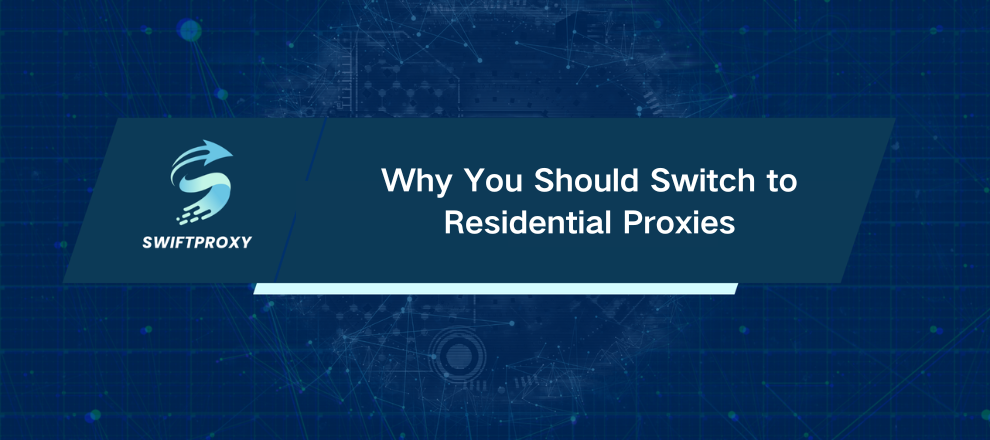Why You Should Switch to Residential Proxies

Over 90% of websites today block or throttle traffic from data center IPs. Why? Because they're easy to spot. Residential proxies? They slip right under the radar. That's why they've become the secret weapon for marketers, researchers, and developers alike.
So, what exactly are residential proxies — and why should you care? Let's break it down.
Residential Proxies Explained
Simply put, a residential proxy routes your internet traffic through an IP address assigned to a real home user by their Internet Service Provider (ISP). This is a key difference from data center proxies, which come from cloud servers or hosting centers. Residential IPs belong to actual devices, making them look more “human” to websites. This trustworthiness drastically reduces the chance of being flagged, blocked, or challenged with captchas.
How Do Residential Proxies Work
When you connect to a residential proxy provider, they assign you an IP from their network—an IP linked to a real user's home. When you make a request, it routes through that IP, masking your actual location and identity.
The process looks like this:
Choose a provider and select your preferred location — country, city, or even ISP.
Connect through a proxy app, browser extension, or proxy management software.
Send your web request, which the proxy then forwards from the assigned residential IP.
The target site sees the residential IP, not yours.
The response comes back through the same chain, keeping you anonymous.
It's like wearing a mask that's invisible to the web — a mask that lets you blend seamlessly into the crowd.
Picking the Right Residential Proxy Provider
Choosing a provider isn't just about price or IP volume. It's about ethics, reliability, and performance. Take Swiftproxy, for example. They stand out because:
Ethical sourcing: IPs come only from users who opt in, sharing bandwidth for rewards or services. No shady hacks or malware here.
Global coverage with speed: 195+ countries covered, 99.5% uptime, and continuous network optimization mean you get reliable, fast connections.
User-friendly web scraping tools: Want to collect data without coding headaches? Swiftproxy's platform lets you scrape websites effortlessly — build, run, and export with ease.
Why Residential Proxies Matter
You might wonder how residential proxies fit into your work. Here's where they shine:
Web scraping: Harvest product prices, reviews, or competitor data without getting blocked. Rotate IPs to avoid detection.
Social media management: Manage multiple accounts, avoid bans, and access region-locked content without revealing your real location.
SEO monitoring: Check search rankings from different regions. Get unbiased, location-specific insights, free from personalized results.
Private browsing: Surf anonymously. Protect your sensitive data from trackers and hackers alike.
Market price monitoring: Track competitor pricing or flight deals across locations to stay competitive.
Ecommerce cross-border access: Shop or sell globally without geo-restrictions interfering.
App and website testing: Simulate users from different locations to verify performance and UX.
Ad verification: Ensure your online ads show up correctly and aren't subject to fraud or manipulation.
Access local content: Watch shows or access sites that are region-locked.
How Providers Get Residential IPs
Not all residential proxies are created equal. Legitimate providers source IPs ethically:
SDK partnerships: Apps integrate SDKs to share users’ IPs in exchange for rewards. Users opt in.
Bandwidth purchase/leasing: Agreements with ISPs or users to lease unused bandwidth legally.
Beware the dark side: Some providers hijack devices without consent or use stolen credentials. These practices risk user privacy, legal issues, and poor proxy quality.
Types of Residential Proxies
Shared proxies: Multiple users share the same IP. Affordable but less reliable. Great for low-risk, casual tasks.
Dedicated proxies: Yours alone. More costly, but fast and secure. Perfect for sensitive or high-volume work.
Rotating proxies: IPs change regularly based on your settings. Ideal for heavy scraping and diverse geo-targeting.
Pros and Cons at a Glance
Advantages:
High anonymity — nearly impossible to detect.
Trusted by websites — lower risk of bans or captchas.
Massive geographic diversity — access content globally.
Challenges:
Pricier than datacenter proxies.
Can be slower due to shared bandwidth or network complexity.
Slightly higher setup and management overhead.
Final Thoughts
Residential proxies are a necessity for anyone serious about stealth, accuracy, and reach online. Whether scraping data, monitoring SEO, or testing apps worldwide, the right proxy can make or break your efforts.

















































